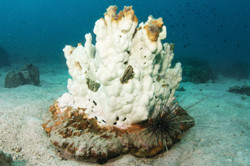Coral bleaching in tropical reef ecosystems
Tropical coral reefs are based on a mutually beneficial relationship between the coral polyp and the microorganisms it contains, the species Symbiodinium. One of the consequences of climate change is coral bleaching, which has become a major threat to corals. Rising temperatures disrupt photosynthesis in the symbiotic algae, resulting in the production of toxic-free oxygen radicals, causing the algae to be expelled. As the stressed corals have lost their main source of energy, they starve. Although some corals regain their algae and recover, others die as a result of increased susceptibility to disease. The EU-funded CORALCLIMRESPONS project investigated the molecular and physiological responses of coral to different environmental stresses. Researchers used different techniques such as metabolomics, transcriptomics and cytology to characterise the Symbiodinium population and the effect of coral stress. Researchers stained and studied the organelles of the coral polyp and of Symbiodinium species using immunofluorescence microscopy. This was carried out first under normal conditions and then under conditions of thermal stress. The team also studied the expression of genes encoding proteins involved in the production and degradation of toxic-free radicals following thermal stress. The aim was to discover candidate genes that might be involved in this process. In addition, the production of secondary metabolites by the host and its symbionts in response to the same stress were also identified. CORALCLIMRESPONS outcomes offer a better understanding of the mechanisms behind coral reef bleaching and associated microbial communities. This will help in the discovery of key genes that can serve as biomarkers for environmental stress. The project's success will also help to maintain European excellence in the scientific study of corals.







